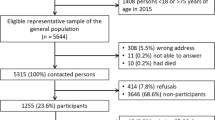Abstract
Background and objectives: Previous studies suggested that the Chinese version of the Short-Form 36 Health Survey (SF-36) had smaller variability in the physical functioning (PF) and physical component summary (PCS) scores than the English SF-36. This may translate into differences in discriminative ability and sample size requirement. Materials and methods: Data were drawn from a community-based survey and a randomised crossover study of Singaporeans bilingual in the Chinese and English languages. The abilities of the two PF and PCS versions in discriminating subjects who reported chronic illness and acute disease symptoms versus those who did not were compared. Results: In all four comparisons (i.e. two health criteria in two studies) the Chinese version of PF showed a larger effect size than the English version. In three out of four comparisons the Chinese version of PCS showed a larger effect size than the English version. Conclusions: The Chinese version appeared more efficient in detecting a statistically significant difference between groups. Other factors being the same, the Chinese SF-36 may require a smaller sample size than the English SF-36 for the studies of physical aspects of health-related quality of life.
Similar content being viewed by others
Abbreviations
- HRQoL:
-
health-related quality of life
- SF-36:
-
Short Form 36 Health Survey
- PF:
-
physical functioning
- PCS:
-
physical component summary
References
CL Lam B Gandek XS Ren et al. (1998) ArticleTitleTests of scaling assumptions and construct validity of the Chinese (HK) version of the SF-36 Health Survey. J Clin Epidemiol 51 1139–1147
J Thumboo KY Fong D Machin et al. (2001) ArticleTitleA community based study of scaling assumptions and construct validity of the English (UK) and Chinese (HK) SF-36 in Singapore. Qual Life Res 10 175–188
J Thumboo KY Fong D Machin et al. (2002) ArticleTitleDoes being bilingual in English and Chinese influence response to quality of life scales? Med Care 40 105–112
Corporate Author. Singapore Census of Population, 2000. Advance Data Release No. 3. Singapore: Singapore Department of Statistics, 2000.
YB Cheung J Thumboo D Machin et al. (2004) ArticleTitleModelling variability of quality of life scores: A study of questionnaire version and bilingualism. Qual Life R 13 897–906
BC Zee D. Osoba (2001) Health-related quality-of-life outcomes. J Crowley (Eds) Handbook of Statistics in Clinical Oncology. Marcel Dekker New York 249–267
PM Fayers D Machin (Eds) (2000) Quality of Life: assessment, Analysis and Interpretation. Wiley Chichester 66–67
J Thumboo KY Fong SP Chan et al. (2002) ArticleTitleThe equivalence of English and Chinese SF-36 versions in bilingual Singapore Chinese. Qual Life Res 11 495–503
CD Sherbourne CJ. Kamberg (1992) Social functioning: Family and marital functioning measures AL Stewart JE Ware SuffixJr (Eds) Measuring Functioning and Well-being: The Medical Outcomes Study Approach. Duke University Press Durham 183–193
J Thumboo PH Feng CH Soh et al. (2000) ArticleTitleValidation of a Chinese version of the Medical Outcomes Study Family and Marital Functioning Measures in patients with SLE. Lupus 9 702–707
DC Montgomery EA Peck GG. Vining (Eds) (2001) Introduction to Linear Regression Analysis. Wiley New York 18–68
JE Ware M Kosinski SD Keller (1994) SF-36 Physical and Mental Health Summary Scales. New England Medical Centre Boston
Author information
Authors and Affiliations
Corresponding author
Rights and permissions
About this article
Cite this article
Cheung, Y.B., Machin, D., Fong, K.Y. et al. Discriminative ability of the Short-Form 36 Health Survey: A tale of two versions. Qual Life Res 14, 555–559 (2005). https://doi.org/10.1007/s11136-004-4849-x
Accepted:
Issue Date:
DOI: https://doi.org/10.1007/s11136-004-4849-x



